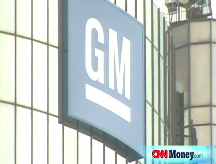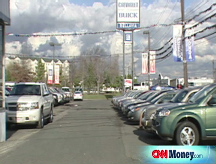Buy American? Betting on a Big 3 bounce
With U.S. automakers now more likely to get some sort of government bailout, it could be time to make some small bets on GM, Ford and some of their suppliers.
NEW YORK (CNNMoney.com) -- The fate of General Motors and the rest of the Big Three may soon be decided in Washington.
With that in mind, here's a crazy question: Is it time to make a contrarian bet on a comeback for GM, Ford and some of their beleaguered parts suppliers? In other words, is it time to buy American?
A few brave souls are starting to think so.
Jason Tyler, director of research operations for Ariel Capital Management, an institutional investment firm based in Chicago, said that GM (GM, Fortune 500), Ford (F, Fortune 500) and other companies with strong ties to the U.S. automotive industry could make sense as short-term trades.
That's mainly because he thinks the odds are now higher that the Big Three will get some sort of bailout from Washington.
"For investors that have a high risk appetite, there is bound to be a couple of automotive stocks that will do ok in the next few months," Tyler said.
Brad Sorensen, director of sector research at Charles Schwab, agreed that there is reason to be slightly more optimistic about the future of GM and Ford.
Sorensen cited House Speaker Nancy Pelosi's remark late Tuesday about bankruptcy not being an option for the Big Three as a sign that the companies will likely get some form of federal assistance.
"It appears Congress is unwilling to allow the major auto manufacturers to enter bankruptcy. That provides some confidence about their future," he said. "GM and Ford have beaten up so much that once you take bankruptcy off the table, if investors wanted to play a high-risk, high-return game, it might make sense to look at the stocks."
It's worth pointing out that both Tyler and Sorensen used the term "high-risk" to describe Ford and GM. Even though shares of Ford are down 60% this year and GM's stock has plunged 80%, it's probably premature to say that either company has a wide open road to prosperity ahead of them.
Tyler cautioned that even if GM, Ford and Chrysler get some loans to keep them afloat for now, it's not as if a bailout will end Detroit's woes.
"The Big Three may be on pace to get more capital but that won't solve the industry's long-term problems. It just may buy them some more time," Tyler said.
With that in mind, Tyler said the only automotive stock that his firm owns is Japanese car manufacturer Toyota Motor (TM). Tyler said he likes Toyota because he believes the company has done a better job of producing cars that people want to buy and has proven it can generate healthy returns on investments.
And Sorensen said Schwab has GM and Ford both rated as a "D" on a typical A to F grading scale. That's obviously not good. He said that a bailout may help but that loans to the Big Three won't do anything to help stimulate demand for cars.
"The biggest problem for the automakers right now is tight credit and a deteriorating economy. How quickly that changes will tell the tale for their recovery," he said.
Still, even though GM and Ford may still be considered too risky to make long-term bets on just yet, another fund manager thinks there is a good buying opportunity in at least one of the Big Three's top suppliers.
Ed Maraccini, a portfolio manager with Optique Capital Management in Milwaukee, said his firm owns auto-parts manufacturer Magna International (MGA) and would be comfortable buying more at current levels. The stock has plummeted 66% this year, largely due to the Big Three's struggles.
But Maraccini said that Aurora, Ontario-based Magna has been unfairly punished by investors and that the market is overlooking that the company has broadened its base of customers and also has a healthy balance sheet -- $2.4 billion in cash and just $685 million in debt.
"Magna has been successful in diversifying its business away from Detroit. The Big Three will always be important but Magna has a growing part of its revenue coming from BMW and Daimler," he said. "The company is in a stronger position to weather the downturn than its competitors."
Of course, any investment in the automotive industry -- domestic or foreign -- is an incredibly big gamble. So nobody should go out and put a huge amount of money into the sector, especially if you don't have the stomach for more volatility.
But now that the Big Three have at least finally presented a plan for a recovery, the downside in many of the auto stocks might be limited from here on out.
Sure, the industry may be stuck in neutral for a long time. But that's better than being stuck in reverse. ![]()




